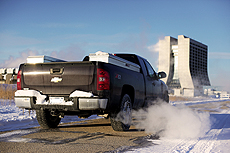American idle
 |
| Idling your vehicle is unhealthy for both your car and the environment. Photo: Naomi Viland |
Thomas Jefferson once said, "Determine never to be idle." It was sound advice then, and it's sound advice now. Of course, he offered this wisdom 100 years before the invention of the internal combustion engine. If he were alive now, he may be pleased to know that his recommendation can be applied to more than just people.
Idling your vehicle is unhealthy for both your car and the environment. We spend a lot of time sitting at idle in our vehicles: at the drive-thru, at traffic lights, waiting to pick someone up, even sometimes at work (but not at a Department of Energy research laboratory such as Fermilab, of course, because it is against lab policy!).
According to Sustainable America, 3.8 million gallons of fuel are wasted by idling in the United States every day. On average, Americans idle 16 minutes a day, and eight of those minutes are spent waiting or warming up a car. The claim is that for every 10 minutes of idling you cut, you save one pound of carbon dioxide from being released into the atmosphere.
The website Iturnitoff.com has a calculator that will show how much you can save by reducing the amount of time you idle your car each day. Not only will you save money, but you will also lower your carbon footprint.
You may be thinking, "But my car needs time to warm up before I can drive it." You aren't alone in that belief. A study in 2009 found that Americans thought they should idle for more than five minutes before driving when temperatures fell below freezing. While this may have been true for older cars with carburetors, modern cars have electronic fuel injection, which means idling to warm up is no longer necessary. In fact, according to a study from Argonne National Laboratory, the catalytic converter warms up much faster when the car is being driven than when it is idling.
Another myth is that idling is better for your vehicle's engine than turning it off and on again. When a car is at idle, it is getting zero miles per gallon. It is in its most inefficient state. According to the Environmental Defense Fund, excessive idling could lead to engine damage.
With respect to DOE fleet vehicles, Executive Orders 13423 and 13514 call for federal agencies to reduce petroleum consumption. Your participation in turning the engine off in a government vehicle when appropriate can be helpful in attaining the DOE mandate. Fermilab policy is that vehicle operators shut off the engine while the motor vehicle is stationary.
So what can we do to reduce or eliminate wasteful idling? It's easy: Just turn the key if you know your vehicle will be stopped for more than 10 seconds — if it is safe to do so, of course!
For more information on how to get better fuel economy, visit the official government source for fuel economy information.
—Eric T. Korzeniowski
|